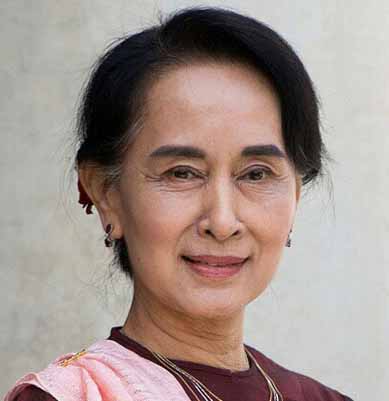
Some men changed their times...
One man changed the World for all times!
Comprehensive Website on the life and works of
Mahatma Gandhi
+91-23872061
+91-9022483828
info@mkgandhi.org

+91-23872061
+91-9022483828
info@mkgandhi.org
Other Gandhis - Aung San Suu Kyi |
- By Saurabh Bhattacharya(This is the story of a lone crusader in Myanmar (Burma) who for decades has adopted the principles of Gandhi - namely nonviolence. Success has not come as yet but Aung San Suu Kyi has not given up those Gandhian principles which inspired her fight for the freedom of her country nonviolently from military rule.)  For the last 15 years, in India's immediate neighbourhood, a frail, soft spoken, mild-mannered woman has been fighting against one of Asia's most ruthless military regimes -without raising a finger in violence. And she is winning! Born to a freedom fighter Aung San Suu Kyi spent four years of her early life studying political science in Delhi University, where she discovered Mahatma Gandhi's philosophy of nonviolence resistance. The years were 1960-64, a period during which Burmese military ruler Ne Win successfully dismantled the country's democratic government through a coup and established a dictatorship. The ruin of Burma had begun in earnest. Suu Kyi entered the mainstream of the Burmese struggle for democracy almost two decades later. In 1988 she visited Burma (now known as Myanmar) to meet her ailing mother. This was the year when the country's capital; Rangoon (now known as Yangon) was engulfed in numerous student-led pro-democracy protests. The movement gained momentum across the country all through the summer of 1988 - the so-called 'Rangoon Spring' - culminating in a mass uprising on August 8. The government, now headed by military leader Sein Lwin, retaliated by massacring thousands of protestors. Although the impact of the protests forced the resignation of Lwin, the military rule remained inviolate. Suu Kyi came into the forefront by sending an open letter to the government asking for the formation of an independent People's Consultative Committee to prepare for multi-party elections,. On August 26, she addressed a rally of 500,000 in Yangon and declared: "This national crisis could be called the second struggle for independence." This struggle which is still continuing is uncannily similar in nature to the movement initiated by Gandhi pre-1947. Suu Kyi helped create the National League for Democracy (NLD) in 1988 and went on extensive campaign tours throughout the country. Her commitment to nonviolence came to the fore once when, during one of her tours, she was confronted by soldiers. When the soldiers threatened to shoot Suu Kyi, she asked her companions to step aside and walked up to and past the rifles aimed at her. In 1989, Suu Kyi was placed under house arrest in Yangon for 'endangering the state'. During this time she began a hunger strike in support of her jailed colleagues. By now Suu Kyi had earned the sobriquet of 'Burma Gandhi'. In 1991, she received the Nobel Peace Prize. Suu Kyi was finally released from virtual house arrest this May. The military regime was forced to lift all restrictions on her political activity. In her first press conference after her release, Suu Kyi said, "My release is not a major triumph for democracy; I will do everything I can to see that democracy comes to Burma very quickly and comes in the right way". The story of Burma's Gandhi is far from over. Source: LIFE POSITIVE PLUS, October-December, 2002. |